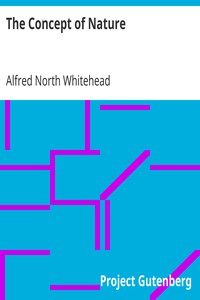The Concept of Nature by Alfred North Whitehead
"The Concept of Nature" by Alfred North Whitehead is a philosophical treatise written in the early 20th century. This work embodies a series of lectures that explore the philosophy of the sciences and the interrelations between various branches of knowledge, particularly focusing on the natural sciences. Whitehead aims to redefine and clarify the nature of scientific inquiry, challenging prevailing notions of matter and substance that have dominated scientific discourse. The opening of
the work outlines the intentions behind the Tarner lectures at Trinity College, establishing a framework for discussing the philosophy of the sciences. Whitehead emphasizes the importance of understanding nature as both a complex of entities and a process that unfolds through time, advocating for a view that avoids dualistic interpretations of reality. He introduces key concepts such as sense-perception, thought, and the distinctions between homogeneous and heterogeneous thinking. Through these foundational ideas, he begins to navigate the challenging terrain of natural philosophy, seeking to unite various scientific perspectives under a cohesive understanding of nature itself. (This is an automatically generated summary.)
Read now or download (free!)
| Choose how to read this book | Url | Size | ||||
|---|---|---|---|---|---|---|
| Read online (web) | https://sendtokindle.compellingsciencefiction.com/ebooks/18835.html.images | 445 kB | ||||
| EPUB3 (E-readers incl. Send-to-Kindle) | https://sendtokindle.compellingsciencefiction.com/ebooks/18835.epub3.images | 204 kB |
Send
to kindle email: |
|||
| EPUB (no images, older E-readers) | https://sendtokindle.compellingsciencefiction.com/ebooks/18835.epub.noimages | 206 kB | ||||
| Kindle | https://sendtokindle.compellingsciencefiction.com/ebooks/18835.kf8.images | 385 kB | ||||
| older Kindles | https://sendtokindle.compellingsciencefiction.com/ebooks/18835.kindle.images | 343 kB | ||||
| Plain Text UTF-8 | https://sendtokindle.compellingsciencefiction.com/ebooks/18835.txt.utf-8 | 375 kB | ||||
| Download HTML (zip) | https://www.gutenberg.org/cache/epub/18835/pg18835-h.zip | 192 kB | ||||
| There may be more files related to this item. | ||||||
About this eBook
| Author | Whitehead, Alfred North, 1861-1947 |
|---|---|
| Title |
The Concept of Nature
The Tarner Lectures Delivered in Trinity College, November 1919 |
| Note | Reading ease score: 49.5 (College-level). Difficult to read. |
| Credits |
Produced by Janet Kegg, Laura Wisewell and the Online
Distributed Proofreading Team at http: //www.pgdp.net |
| Language | English |
| LoC Class | Q: Science |
| Subject | Knowledge, Theory of |
| Subject | Nature |
| Subject | Science -- Philosophy |
| Category | Text |
| EBook-No. | 18835 |
| Release Date | Jul 16, 2006 |
| Copyright Status | Public domain in the USA. |
| Downloads | 418 downloads in the last 30 days. |
| Project Gutenberg eBooks are always free! | |

